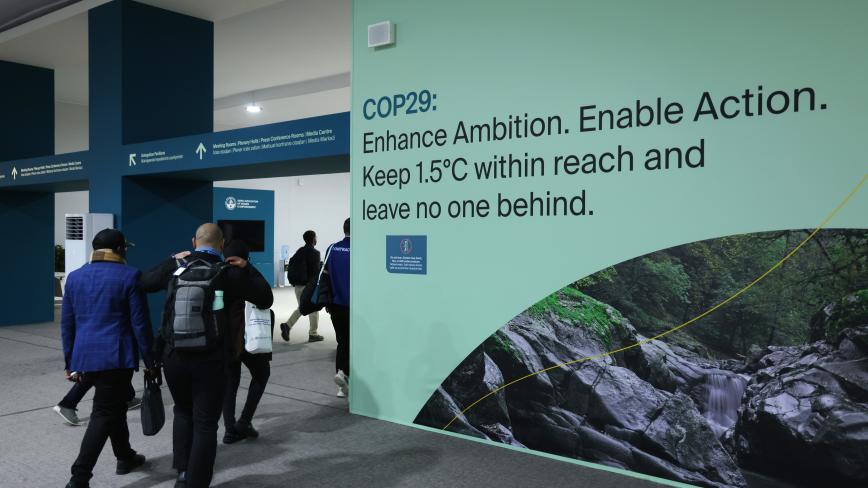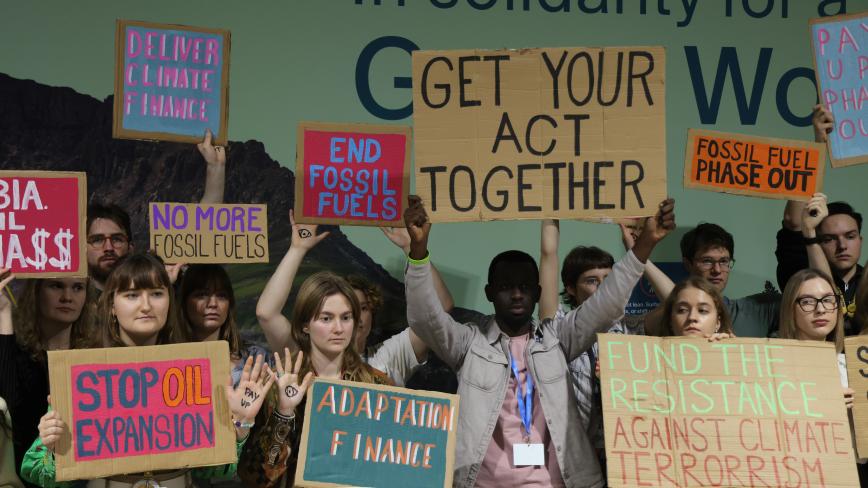For the second year in a row, health was a prominent focus at the United Nations Climate Change Conference, this year held in November in Baku, Azerbaijan. This signals the continuation of a promising shift in recognizing human health and wellbeing as an essential piece of the climate conversation. While the climate-health nexus was not a dedicated negotiation topic this year, it was featured in many discussions at COP29, reflecting the commitments of the Declaration on Climate and Health adopted at COP28 in 2023 in Dubai.
"Finance is a prerequisite for climate action sufficient to protect human health"
The central priority of this year’s negotiations was to devise a plan for how to fund climate mitigation and response globally. COP29 delegates hoped to update the existing finance goal, which stated that developed countries who have disproportionally contributed to the climate crisis have an obligation to compensate developing countries annually to help them adapt to its impacts. The original finance goal was set in Copenhagen at COP15 at $100 billion per year. A group of leading economists have argued for increasing the commitment from developed nations to $1 trillion annually to meet the needs of poorer nations. After extended delays and intense negotiations – including a walkout from dozens of small island and least-developed countries – the negotiations settled on a final deal of only $300 billion per year, a blow to developing countries who will need far more resources to manage the impacts of climate change. “The USD$300 billion per year deal negotiated in Baku is weak, shortsighted and wholly inadequate to address the mounting threats of the climate crisis and fails to protect the millions of lives on the line,” remarked Jess Beagley, Policy Lead at the Global Climate and Health Alliance in a press release.
"Water is at the heart of climate change"
One important development for climate and health was the COP29 Declaration on Water for Climate Action. Endorsed by almost 50 countries, the declaration commits to using integrated approaches to address climate change’s impact on water resources, water basins, and other water-based ecosystems. It also calls for the use of water-related mitigation and adaptation strategies and, crucially, for ensuring that water remains a high priority on future COP agendas. Efforts to improve water quality could significantly reduce the spread of infectious diseases. This commitment is compelling: currently 2.2 billion people lack access to safe drinking water and 3.5 billion don’t have safely managed sanitation. Better strategies to manage droughts and floods could improve community resilience and reduce the illnesses, accidents, and deaths caused by these events. Over 90 percent of people affected by climate disasters suffer the accompanying effects of water-related disasters.
"Health is the Argument for Climate Action"
The World Health Organization (WHO) was a key advocate for including health in climate negotiations this year, including publishing a special report on climate and health ahead of COP29 titled, “Health is the Argument for Climate Action.”
A high-level event, “COP Presidencies Bringing Health at the Centre of Climate Agenda,” announced the COP Presidencies Continuity Coalition for Climate and Health, which seeks to permanently integrate health into climate action by establishing a collaborative partnership between the WHO and the presidents of COPs 26 through 30. Together, these entities will “mobilize collective efforts and funding to enhance climate and health initiatives, promote adherence to previous health-related pledges and commitments, and harmonize ongoing climate and health projects” (WHO, Climate Change and Health). The Director-General of the WHO, Dr. Tedros Adhanom Ghebreyesus, celebrated this milestone, remarking that “this coalition represents a collective will to prioritize climate and health now and for the future.”
The U.S. implications for future progress in climate action
Given the U.S.’s traditional leadership role, a central (albeit unofficial) theme of COP29 was the U.S.’s future engagement in climate negotiations. The COP29 United States delegation asserted that “America is All In.” Yet, the U.S.'s future engagement in climate negotiations is shrouded in uncertainty. Following on the heels of Argentina who withdrew the Argentine delegation from COP29, climate leaders at COP and around the world have expressed concern that the U.S. will be the next to pull out of the 2015 Paris Agreement, slowing climate progress further. U.S. Climate Envoy John Podesta, had a more optimistic take, asserting that the U.S. will remain committed to climate action: “The work to contain climate change is going to continue in the U.S. with commitment and passion and belief.”
In California, state leadership is calling on the legislature to safeguard its progressive climate policies, including, for example, fiscal incentives that have significantly increased the number of electric vehicles on the state’s roads and funded efforts to address the health of communities during climate events, all key strategies for reducing improving climate-related health outcomes.
"COP30 will be our last chance"
Next year’s UN climate change conference (COP30) will take place in Belém, Brazil, marking a significant milestone: the tenth anniversary of the 2015 Paris Agreement. This highly anticipated event will offer a crucial opportunity for nations to reckon with gaps in the progress achieved since Paris. The first global stock take, which concluded at COP28, found that efforts to meet the temperature goals of the Paris Agreement have been insufficient, and the effects of warming beyond this threshold will be increasingly difficult for humans to adapt to and manage. In 2025, countries will finalize their third set of national climate action plans – known as nationally determined contributions (NDCs) – which UN Climate Change Executive Secretary Simon Stiell has called “the most important policy documents of this century.” The new NDCs create a significant opportunity to realign climate goals with scientific evidence, including the critical connection to health and well-being, and to get the world back on track to achieve a climate-resilient and livable future. Brazil President Luiz Inácio Lula da Silva offered the sobering observation, “COP30 will be our last chance to avoid an irreversible rupture in the climate system.”
This article was developed and written by UC Center for Climate, Health and Equity Program Manager, Annie Rosenthal, MSW and Founding Co-Director and UCSF Professor of Medicine Arianne Teherani, Ph.D. in collaboration with Strategic Advisor and UCSF Professor of Pediatrics and Obstetrics and Gynecology Claire Brindis, Ph.D.; Research Specialist Annemarie Charlesworth, M.A.; Research Specialist Sigal Maya, M.S; and Associate Director, Communications and Strategy Jen Zakaras, MPH.


